Florynce Kennedy
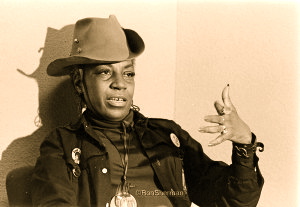
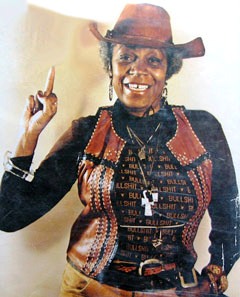 Florynce Kennedy, publicity picture c.1976
Florynce Kennedy, publicity picture c.1976
Florynce Rae “Flo” Kennedy (February 11, 1916 – December 22, 2000), was an American lawyer, activist, civil rights advocate, and feminist.
Early Life
Kennedy was born in Kansas City to an African-American family. Her father Wiley Kennedy was a Pullman porter, and later had a taxi business. The second of her parents’ five daughters, she had a happy childhood, full of support from her parents, despite experiencing poverty in the Great Depression and racism in her mostly white neighborhood. She later commented, “My parents gave us a fantastic sense of security and worth. By the time the bigots got around to telling us that we were nobody, we already knew we were somebody.”
 Kennedy graduated at the top of her class at Lincoln High School, after which she worked many jobs including owning a hat shop and operating elevators. After the death of her mother Zella in 1942, Kennedy left Kansas for New York City, moving to an apartment in Harlem with her sister Grayce. Of the move to New York she commented, “I really didn’t come here to go to school, but the schools were here, so I went.” In 1944 she began classes at Columbia University School of General Studies, majoring in pre-law and graduated in 1949. However, when she applied to the university’s law school, she was refused admission. In her autobiography Kennedy wrote, “The Associate Dean Willis Reese, told me I had been rejected not because I was a Black but because I was a woman. So I wrote him a letter saying that whatever the reason was, it felt the same to me, and some of my more cynical friends thought I had been discriminated against because I was Black.” Kennedy met with the Dean and threatened to sue the school. They admitted her.
Kennedy graduated at the top of her class at Lincoln High School, after which she worked many jobs including owning a hat shop and operating elevators. After the death of her mother Zella in 1942, Kennedy left Kansas for New York City, moving to an apartment in Harlem with her sister Grayce. Of the move to New York she commented, “I really didn’t come here to go to school, but the schools were here, so I went.” In 1944 she began classes at Columbia University School of General Studies, majoring in pre-law and graduated in 1949. However, when she applied to the university’s law school, she was refused admission. In her autobiography Kennedy wrote, “The Associate Dean Willis Reese, told me I had been rejected not because I was a Black but because I was a woman. So I wrote him a letter saying that whatever the reason was, it felt the same to me, and some of my more cynical friends thought I had been discriminated against because I was Black.” Kennedy met with the Dean and threatened to sue the school. They admitted her.
Activism
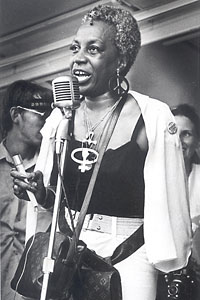 Kennedy graduated from Columbia Law School in 1951. By 1954 she had opened her own office, doing matrimonial work, and some assigned criminal cases. She was a member of the Young Democrats. In 1956, she formed a legal partnership, which proved disastrous, and she was left with huge debts. Her partner had represented Billie Holiday, helping her avoid drug charges during her final days. Kennedy then came to represent Holiday’s estate, and also that of Charlie Parker, making waves in her attempts to recover monies owed to those estates. She also worked as an activist for feminism and civil rights, and the cases she took on increasingly tended to be related to these causes. She was close friends with fellow Columbia law graduate Morton Birnbaum MD, whose concept of sanism she influenced during the 1960’s.
Kennedy graduated from Columbia Law School in 1951. By 1954 she had opened her own office, doing matrimonial work, and some assigned criminal cases. She was a member of the Young Democrats. In 1956, she formed a legal partnership, which proved disastrous, and she was left with huge debts. Her partner had represented Billie Holiday, helping her avoid drug charges during her final days. Kennedy then came to represent Holiday’s estate, and also that of Charlie Parker, making waves in her attempts to recover monies owed to those estates. She also worked as an activist for feminism and civil rights, and the cases she took on increasingly tended to be related to these causes. She was close friends with fellow Columbia law graduate Morton Birnbaum MD, whose concept of sanism she influenced during the 1960’s.
In the 1970s Kennedy traveled the lecture circuit with writer Gloria Steinem. If a man asked the pair if they were lesbians – a stereotype of feminists at the time – Kennedy would quote Ti-Grace Atkinson and answer, “Are you my alternative?” She was an early member of the National Organization for Women, but left then in 1970, dissatisfied with their approach to change. In 1971 she founded the Feminist Party, which nominated Shirley Chisholm for president. She also helped found the Women’s Political Caucus. Beginning in 1972 she served on the Advisory Board of the Westbeth Playwrights Feminist Collective, a New York City theatre group which produced plays on feminist issues.
Kennedy is known for her pro-choice activism on abortion, writing a book with Diane Schulder called Abortion Rap. Kennedy is sometimes claimed to have coined the phrase “If men could get pregnant, abortion would be a sacrament,” although Gloria Steinem attributed it to “an old Irish woman taxi driver in Boston,” who she said she and Kennedy met. In 1972, Kennedy filed tax evasion charges with the Internal Revenue Service against the Catholic Church, saying that their campaign against abortion rights violated the separation of church and state.
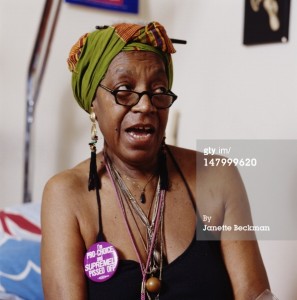 On the side of civil rights, Kennedy established the Media Workshop in 1966 to picket and lobby the media over their representation of Black people. She stated that she would lead boycotts of major advertisers if they didn’t feature black people in their ads. She attended all three Black Power conferences and represented H. Rap Brown and the Black Panthers.
On the side of civil rights, Kennedy established the Media Workshop in 1966 to picket and lobby the media over their representation of Black people. She stated that she would lead boycotts of major advertisers if they didn’t feature black people in their ads. She attended all three Black Power conferences and represented H. Rap Brown and the Black Panthers.
Kennedy was known for her flamboyant dress – often in cowboy hats and pink sunglasses – and attitude. Once, to protest the lack of female bathrooms at Harvard, she led a mass urination on the grounds. When asked about this, she said “I’m just a loud-mouthed middle-aged colored lady with a fused spine and three feet of intestines missing and a lot of people think I’m crazy. Maybe you do too, but I never stop to wonder why I’m not like other people. The mystery to me is why more people aren’t like me.” Kennedy was well known for pithy, humorous and highly quotable statements, such as, “If the ass is protecting the system, ass-kicking should be undertaken regardless of the sex, ethnicity, or charm of the ass involved,” and “I know we’re termites. But if all the termites got together, the house would fall down.” In 1974, People magazine wrote that she was “The biggest, loudest and, indisputably, the rudest mouth on the battleground.”
Acting
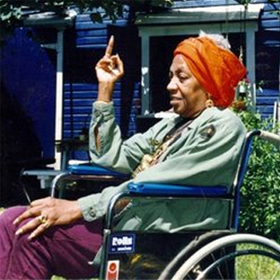 Aside from her legal and activist work, Kennedy also acted in two films. In The Landlord (1970), she played “Enid the Maid”, and in the independent political drama Born In Flames (1983), she played “Zella.”
Aside from her legal and activist work, Kennedy also acted in two films. In The Landlord (1970), she played “Enid the Maid”, and in the independent political drama Born In Flames (1983), she played “Zella.”
Later Life and Death
In 1976, Kennedy wrote an autobiography called Color Me Flo: My Hard Life and Good Times, in which she wrote about her life and career. She died on December 12, 2000, at the age of 84.

